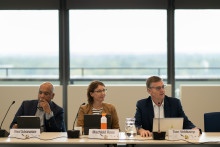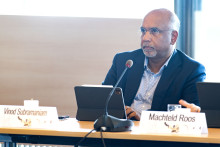‘When we talk to colleagues at various levels of the university, everyone has examples of flaws of the AFAS system,’ said Emile Dopheide on behalf of the UC. ‘We are aware that every new system comes with shortcomings and faces acceptation problems. We also know that HR is working hard to fix the problems. However, after almost one year in use, complaints and frustrations about AFAS-HR among staff are still widely felt and that is why we found it important to put this issue on the agenda.’
Complicated workflows and privacy concerns
The Council divided the main shortcomings of AFAS into three categories, explains Dopheide. ‘The first one of them user friendliness. The system is not user friendly. We find our way, but it is not a straightforward way to find information. Secondly, the system leads to complicated and time-consuming workflows. Lastly, there seem to be privacy issues. For instance, we have learnt that all HR staff has access to all UT staff information. We ask if this is a desirable situation.’
‘We take this very seriously,’ responded Machteld Roos, Vice-President of the Executive Board (EB). ‘You want such a system to function and be reliable. Every change comes with problems, but this is taking rather long and it should be fixed at a certain point. HR staff indeed has access to personal files, but only to general information, not all details. It’s on top of mind. It is time to evaluate where we stand now, what is sorted out and what are still open issue and what actions we should take. It is not only discussed here at the UT, but also at other universities that have AFAS in place.’
Extra work for HR
To further demonstrate the problem, Council member Dick Meijer shared his personal experience with AFAS. ‘I’ve experienced a lot of problems with it, but I’ll only mention the last one. Last month, I got a letter through AFAS that I was being fired as of November. This is not the case. I also got 5000 euros extra on my salary. HR helped me solve this, but this kind of thing happens all the time. It generates a lot of stress on side of personnel and a lot of extra work for HR, who have to fix everything by hand. Of course there will be problems, but this many I never seen before. That is something we need to learn from.’
‘We take these signals very seriously and we certainly look at what lessons we can learn from this for the future,’ said Vinod Subramaniam, President of the EB. ‘We need to make sure we are testing, testing, testing and testing again before we go live with such a system.’
As the University Council requested, the Board will carry out an evaluation of the AFAS-HR system. Its findings and a proposed follow-up should be shared in six months.







